Table of Contents
Introduction
Have you ever wondered how successful businesses keep their operations running smoothly around the clock?
The answer lies in the “Swing Shifts” technique.
Ever-increasing demands for flexibility and continuous services have led to a rise in unconventional work schedules.
Did You Know?
The Bureau of Labor Statistics data reveals that about 2.4% of the working population engages in rotating shifts.
A staggering 15 million Americans navigate through evening shifts, night shifts, rotating shifts, or the intriguing world of swing shift hours.
In this blog, we’ll unravel the mystery behind swing shifts, explore their benefits, and share valuable tips for seamless integration into your business model.
Understanding Swing Shifts
Definition:
A swing shift, also known as a “swing schedule” or “second shift,” refers to a work arrangement where employees’ hours extend beyond the traditional 9-to-5 timeframe.
Concept:
The concept of a swing shift revolves around adaptability and catering to the diverse needs of employees and employers.
This innovative scheduling approach enables businesses to maintain operational continuity during critical periods, accommodating variations in demand and promoting a more inclusive work environment.
How Does A Swing Shift Schedule Work?
- Shift Transition
The defining characteristic of a swing shift is the transition it facilitates between day and night hours. For instance, a swing shift might commence at 3:00 PM and conclude at 11:00 PM.
- Overlap Period
There’s often an intentional overlap with the preceding day or night shifts. This ensures a smooth handover of responsibilities and seamless continuity in operations. For example, the overlap might occur between 7:00 PM and 8:00 PM.
- Task Distribution
During the swing shift, tasks are distributed based on the nature of the work and peak hours. For example, a customer service representative may handle evening inquiries while manufacturing staff focus on late-stage production.
- Breaks and Rest
To maintain employee well-being, swing shifts incorporate breaks strategically. For instance, a short break around 5:00 PM and a meal break around 8:00 PM might be scheduled.
- Flexibility In Scheduling
The beauty of swing shifts lies in their adaptability. Employees can be assigned to swing shifts based on their preferences or the business’s operational needs. This flexibility fosters a dynamic and efficient workforce.
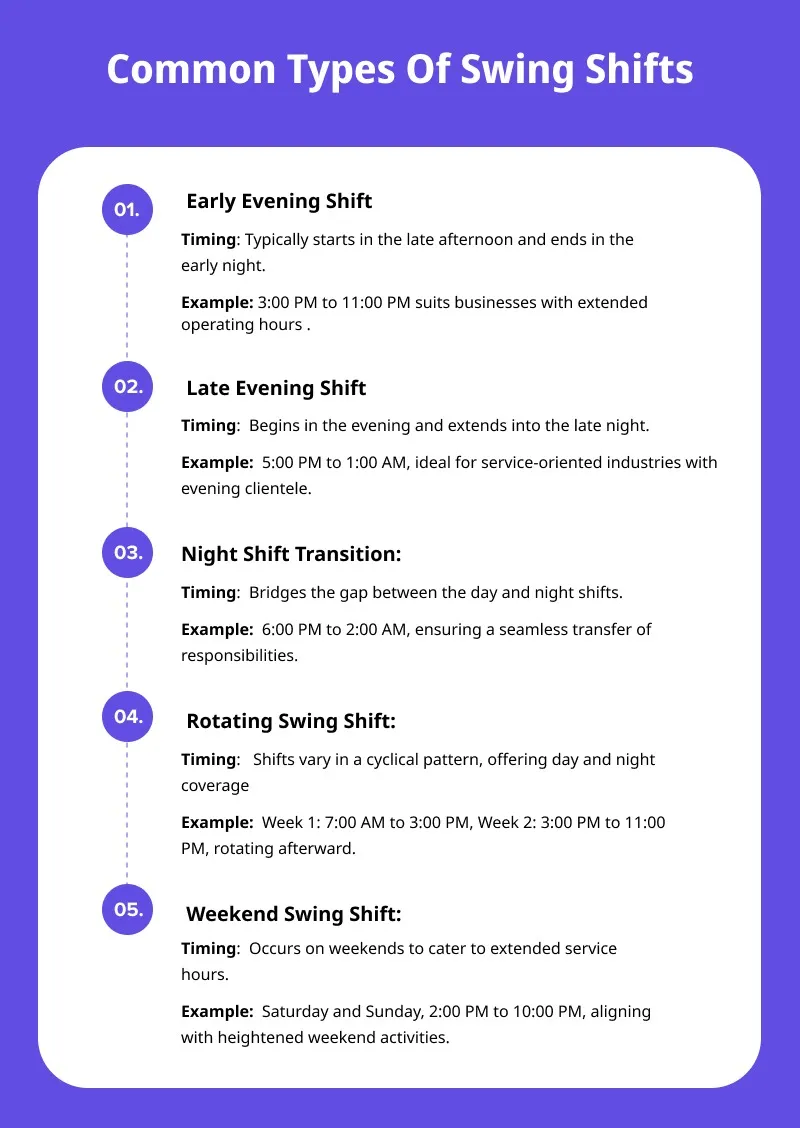
Industries Where Swing Shifts Are Common
Swing shifts are commonly utilized in various industries where work needs to be done around the clock. Some of the common sectors that frequently employ swing shifts include:
- Hospitality
Hotels, restaurants, and event management companies require staff availability during peak evening hours, making swing shifts essential for maintaining high service standards.
- Retail
Many retail businesses, especially those with extended operating hours, rely on swing shifts to ensure adequate coverage during peak times and effectively manage customer traffic.
- Healthcare
Hospitals and medical facilities operate 24/7, making swing shifts crucial for providing continuous patient care and ensuring adequate staffing is available at all times.
- Transportation
Industries such as trucking and logistics often use swing shifts to enable drivers to operate during off-peak hours, reducing traffic congestion and optimizing delivery schedules.
- Customer Service
Call centers and customer support services frequently utilize swing shifts to ensure customer inquiries can be handled during extended hours of operation.
- Public Safety
Emergency services, law enforcement, and fire departments rely on swing shifts to maintain round-the-clock coverage and respond to incidents as they arise.
Benefits Of Swing Shifts
Swing shifts offer a range of advantages for both businesses and employees, contributing to enhanced productivity, flexibility, and overall operational efficiency. Here are some key benefits:
- Flexibility For Employees
Swing shifts provide employees with scheduling flexibility, accommodating those who prefer or need to work during non-traditional hours.
- Increased Productivity
With staggered shifts, businesses can maintain continuous operations, leading to increased productivity and output.
- 24/7 Operations
Industries requiring constant availability, such as healthcare and emergency services, benefit from swing shifts to ensure uninterrupted services.
- Improved Work-Life Balance
Swing shifts give employees more control over their work schedules, promoting a healthier work-life balance.
- Adaptability to Peak Hours
Businesses experiencing peak demand during specific hours can deploy swing shifts to allocate resources efficiently.
Swing Shifts Challenges And Workstatus Solutions
Challenge: Tracking Hours Accurately Across Different Shifts
Navigating the intricacies of managing employee hours during swing shifts involves dealing with varying start and end times, often leading to time-tracking complexities.
The traditional methods, such as paper-based or manual systems, are prone to errors, exacerbating challenges in accurately recording work hours during non-traditional schedules.
Solution: Mastering Swing Shifts with Workstatus
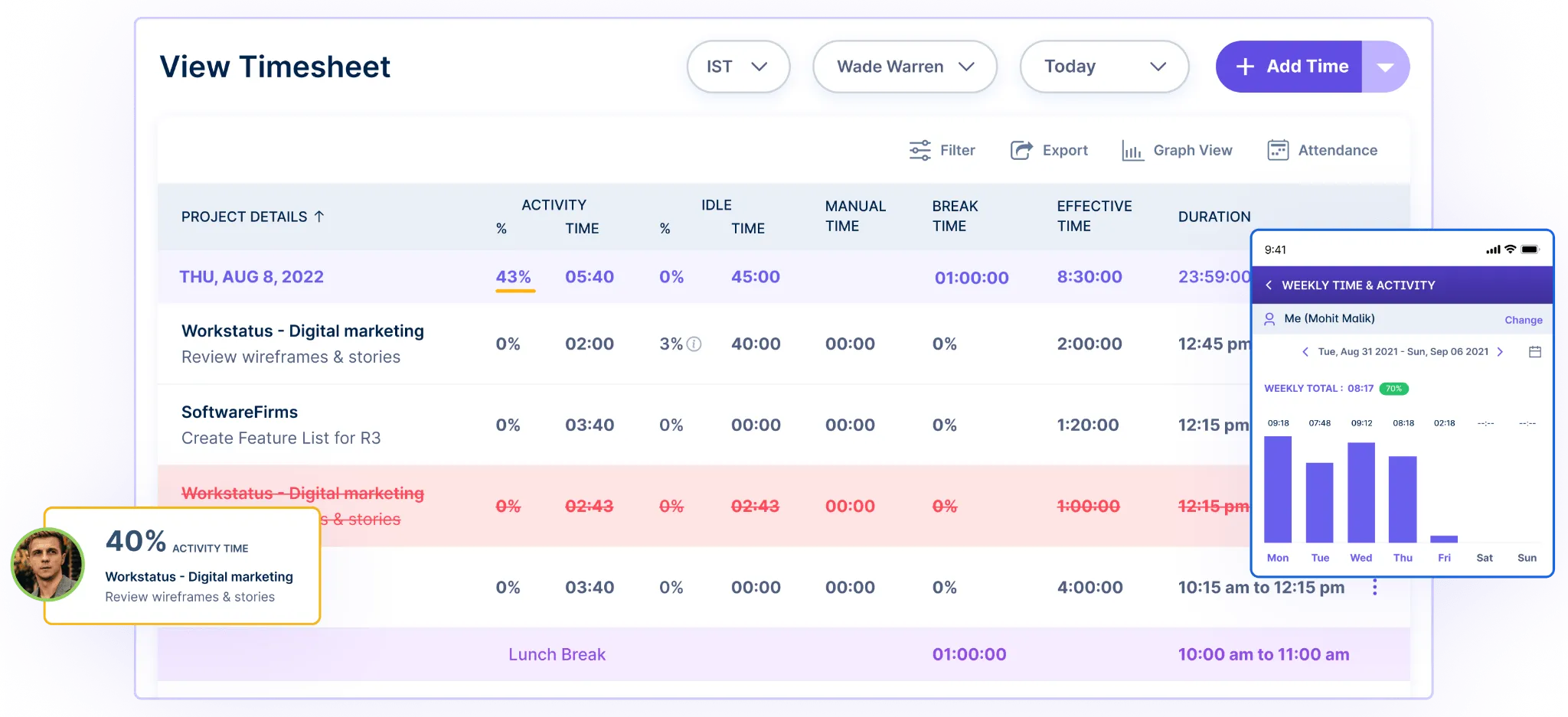
In response to the challenges inherent in swing shift timekeeping, Workstatus introduces innovative solutions that streamline the tracking process, ensuring accuracy and efficiency.
- Online Timesheets
Workstatus online timesheets provide a centralized and digital platform, offering a user-friendly interface for employees to log their hours worked during varying shifts.
-
- Automation
The system automates time tracking, minimizing the risk of errors associated with manual methods and providing a seamless experience for employees managing their swing shift hours.
- Real-Time Visibility
Managers gain real-time insights into employee hours, facilitating precise payroll processing and ensuring equitable compensation for the unique demands of swing shifts.
Challenge: Ensuring Punctuality And Preventing Buddy Punching
The demand for accuracy in attendance records during swing shifts is heightened due to the irregular schedules.
Conventional methods like punch cards are vulnerable to issues such as buddy punching, where one employee clocks in for another, compromising the integrity of attendance records.
Solution: Combatting Buddy Punching with Workstatus
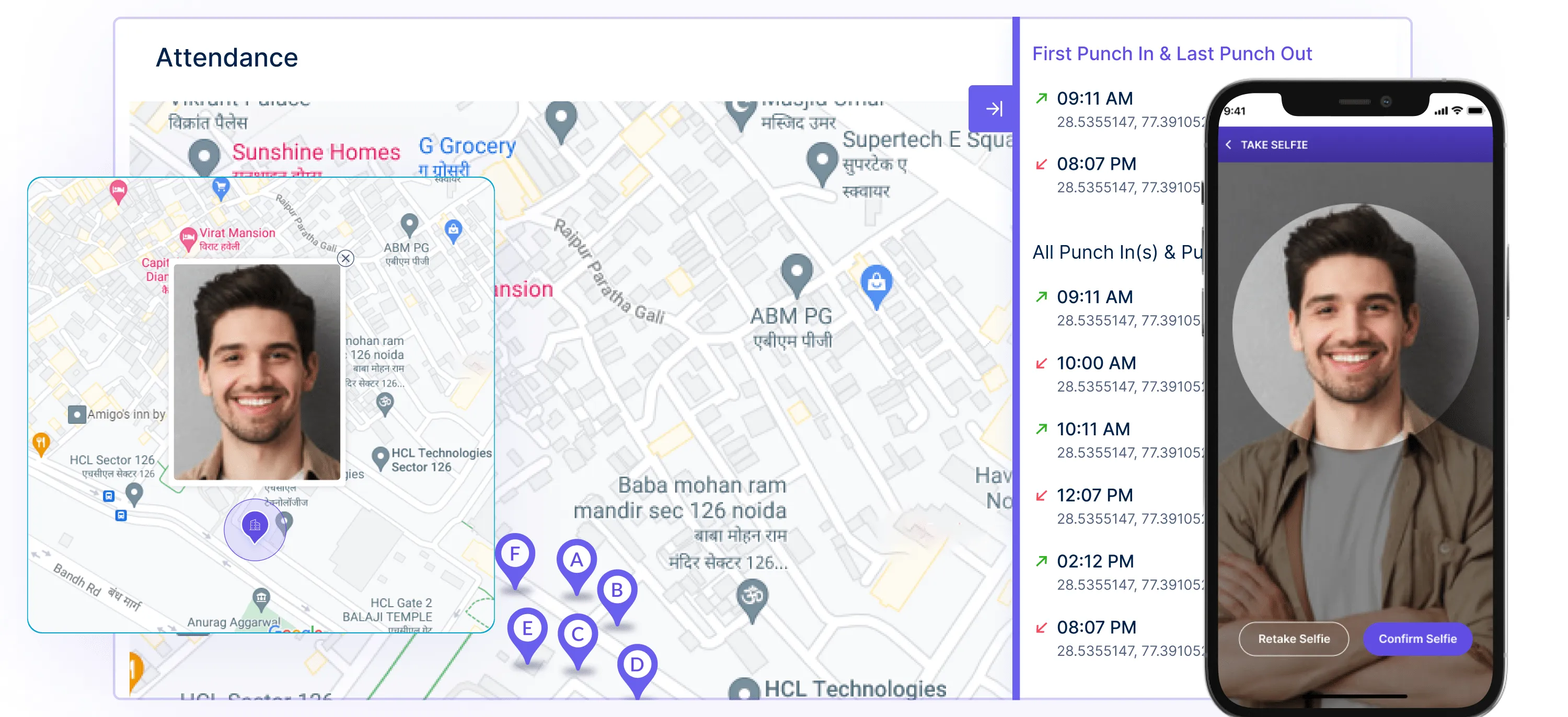
To address the need for enhanced attendance management in swing shift scenarios, Workstatus integrates advanced features to ensure punctuality and combat deceptive practices like buddy punching through:
- Selfie Validation
Workstatus attendance management includes a selfie validation feature, requiring employees to authenticate their clock-ins with a selfie.
This added layer of security ensures that the individual registering attendance is indeed the designated employee.
- Geofencing
The system employs geofencing to restrict clock-ins to predefined geographical locations, mitigating the risk of attendance fraud by ensuring employees are physically present at the designated workplace.
- Biometric Verification
Beyond selfies, additional biometric verification methods, such as fingerprint or facial recognition, can be seamlessly integrated, providing further authentication for swing shift attendance.
Challenge: Managing Complex Swing Shift Schedules
Crafting and adjusting shift schedules for swing shifts requires a nuanced approach to meet the demands of both employees and the business.
The scheduling process becomes intricate with factors like individual preferences, peak hours, and coverage requirements during different shifts.
Solution: Efficient Swing Shift Scheduling with Workstatus
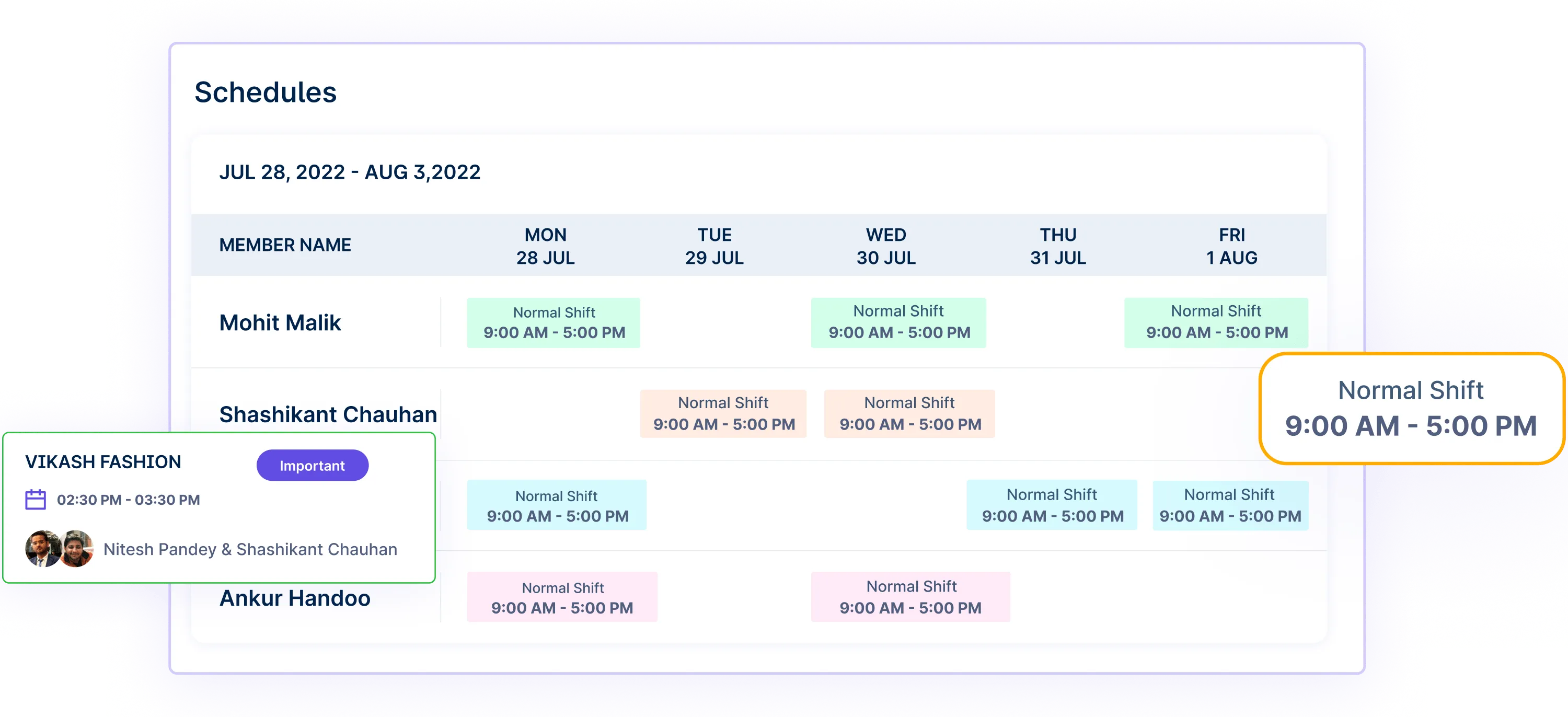
Simplifying the complexities of managing swing shift schedules, Workstatus equips managers to efficiently create, assign, and optimize schedules tailored to the unique dynamics of swing shifts through:
- Shift Management
Workstatus-specialized shift management features empower managers to create flexible schedules that accommodate the irregularities of swing shifts, optimize coverage, and ensure the effective utilization of workforce resources.
- Employee Availability Tracking
The system efficiently tracks and incorporates employee availability, facilitating the creation of swing shift schedules that align with individual preferences and constraints.
- Automated Alerts and Notifications
Automated alerts provide timely notifications to managers about potential scheduling conflicts or gaps in coverage, enabling proactive adjustments to maintain adequate staffing levels during swing shifts.
Challenge: Time Off Management In Swing Shifts
Coordinating time-off requests becomes a delicate task in swing shift scenarios due to the irregular working hours.
Balancing the needs of employees for downtime with the necessity for adequate coverage during varying shifts poses a unique challenge.
Solution: Simplifying Time off Requests with Workstatus
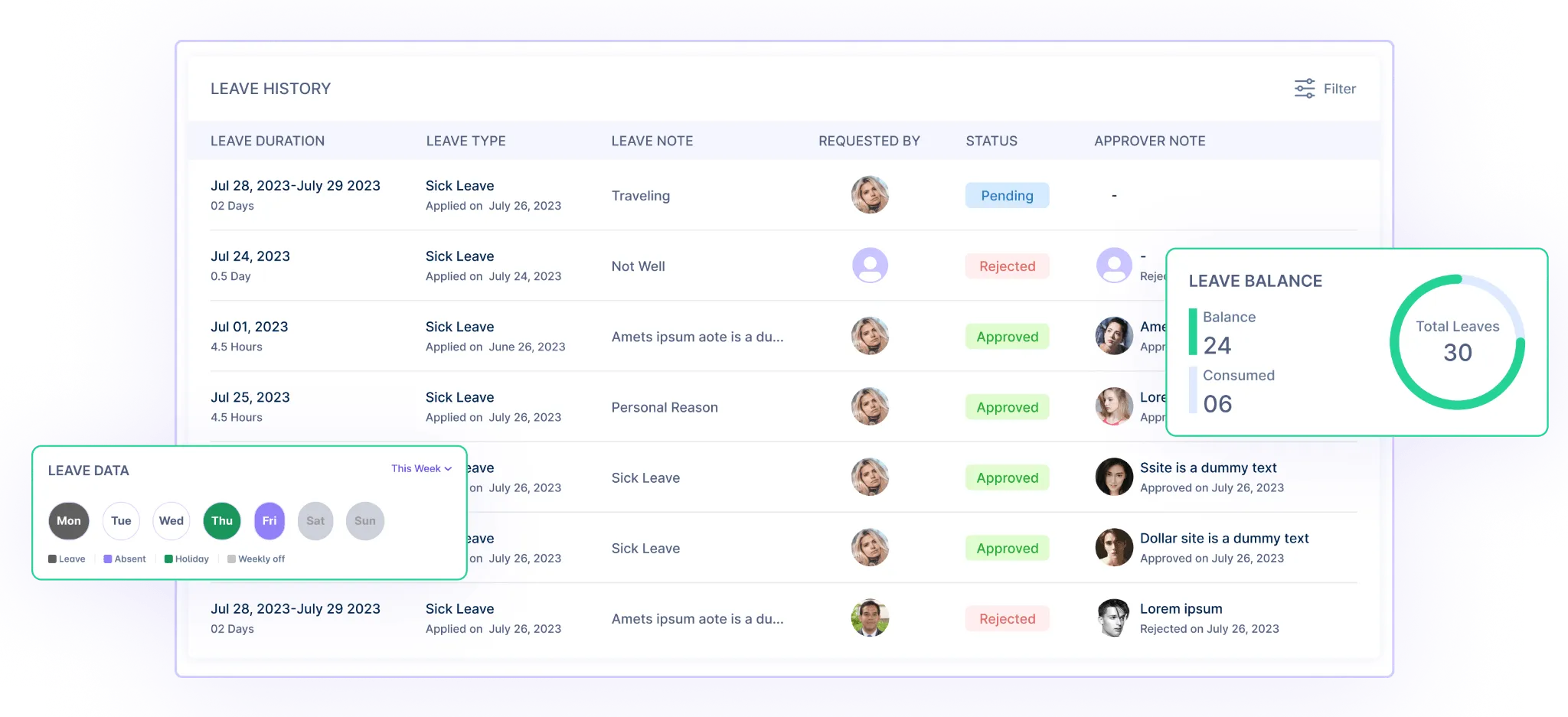
Recognizing the intricacies of time-off management in swing shifts, Workstatus introduces a streamlined process, ensuring a balance between employee preferences and operational requirements.
- Centralized Time Off Management
The Workstatus platform allows employees to request time off digitally, providing a centralized space for managers to review and approve requests efficiently.
- Shift Coverage Insights
The system offers insights into the potential impact of time-off approvals on shift coverage, empowering managers to make informed decisions that maintain a balance in staffing during swing shifts.
- Automated Approval Workflow
Automated workflows for time-off approvals expedite the process, ensuring that requests are handled promptly minimizing disruptions in scheduling for swing shifts.
Challenge: Workforce Optimization In Swing Shifts
Maximizing productivity during swing shifts requires careful workforce optimization. Critical aspects include understanding peak productivity hours, identifying potential bottlenecks, and ensuring efficient task distribution.
Solution: Maximizing Productivity with Workstatus
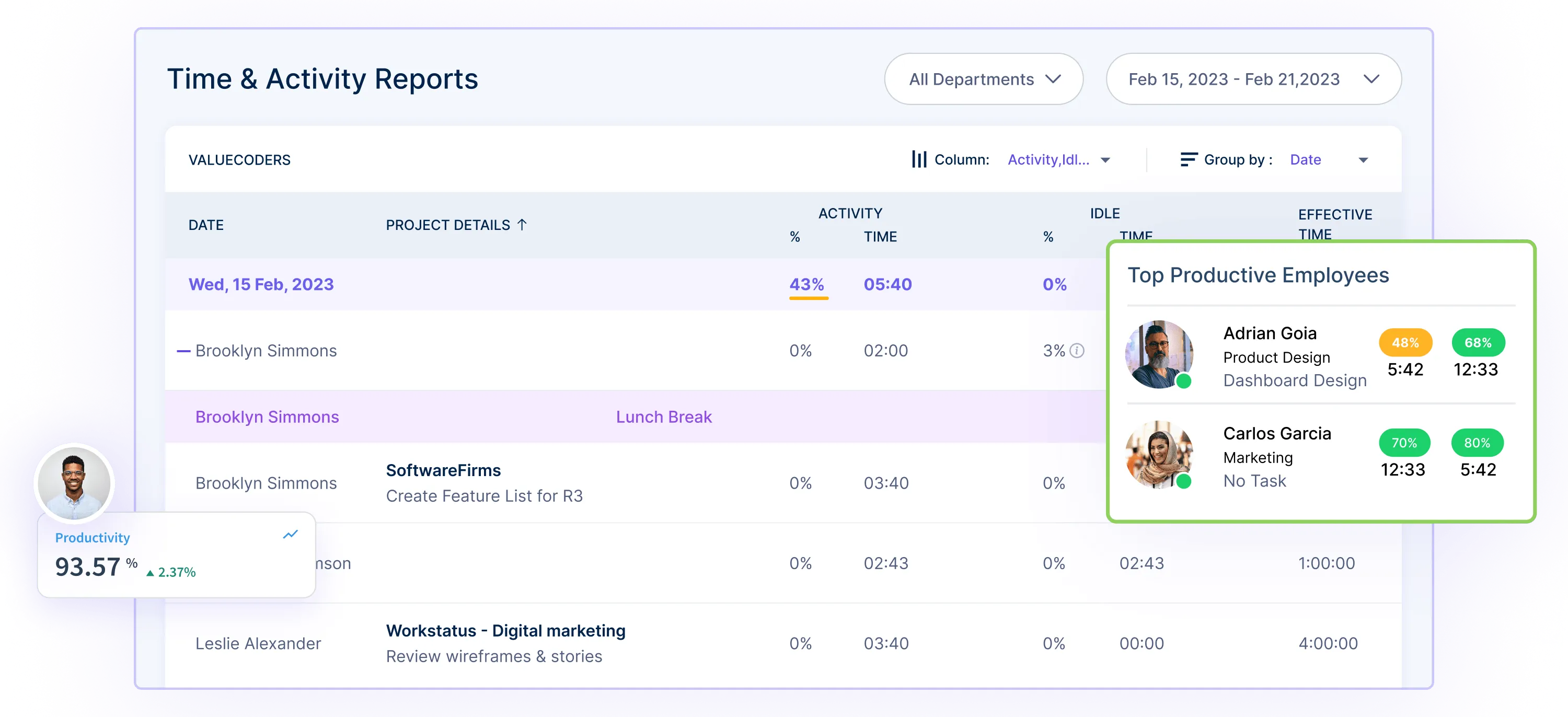
Workstatus focuses on workforce optimization and addresses the challenges of maximizing productivity during swing shifts through advanced insights.
- Real-Time Monitoring
Workstatus provides real-time monitoring features that allow managers to track employee activities and productivity during swing shifts, facilitating on-the-fly adjustments.
- Productivity Reports
Detailed productivity reports offer insights into employee performance patterns during different shifts, enabling managers to identify trends and implement strategies for optimizing workforce productivity.
- Task Assignment and Balancing
The platform allows for efficient task assignment and balancing, ensuring that workloads are distributed equitably among team members enhancing overall productivity during swing shifts.
Challenge: Addressing Employee Burnout in Swing Shifts
The irregular and often demanding nature of swing shifts can contribute to employee burnout. Identifying signs of burnout and proactively addressing them becomes crucial for sustaining a healthy and motivated workforce.
Solution: Prioritizing Well-being in Swing Shifts with Workstatus
![]()
Workstatus features include mechanisms to identify and address employee burnout recognizing the importance of maintaining well-being during the challenges posed by swing shifts.
- Workload Insights
The platform provides insights into employee workloads, helping managers identify signs of burnout by recognizing extended hours or high-stress level patterns during swing shifts.
- Flexible Scheduling Options
Workstatus supports flexible scheduling options, allowing managers to adjust based on individual needs and preferences, preventing excessive fatigue and mitigating the risk of burnout.
Challenge 7: Workload Management Across Swing Shifts
Balancing workloads effectively becomes a complex task in swing shift scenarios where varying schedules and demands add layers of intricacy.
Ensuring fair distribution of tasks and preventing overload is essential for maintaining a productive and healthy workforce.
Solution: Balancing Tasks Across Swing Shifts with Workstatus
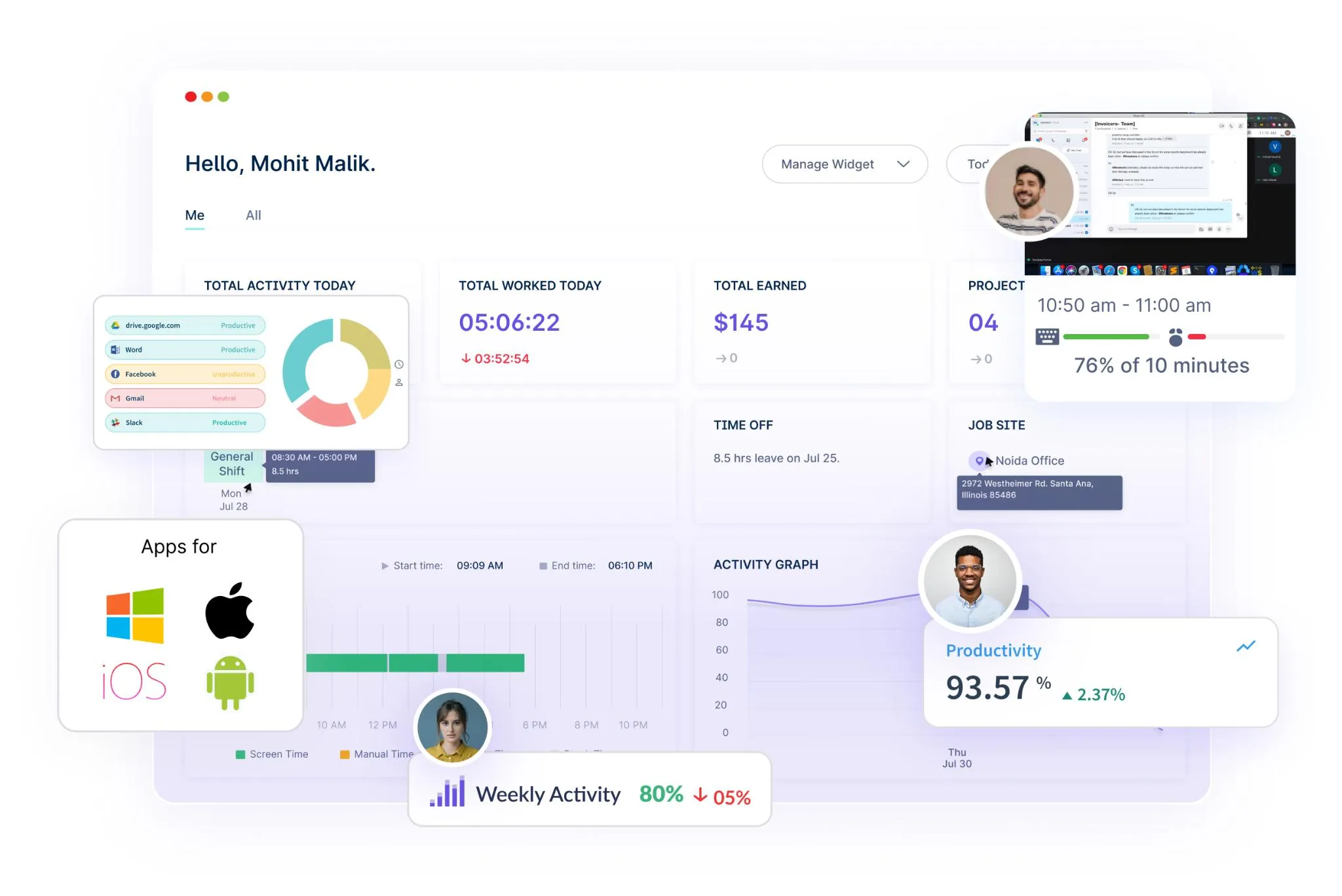
Workstatus, a suite of features, is designed to simplify workload management challenges specific to swing shifts, offering analytics that empower managers to achieve an equitable distribution of tasks.
- AI-Powered Workload Insights
Workstatus AI-powered reports provide comprehensive insights into workload distribution, helping managers identify trends and patterns across swing shifts for informed decision-making.
- Task Allocation Tools
The platform offers tools for efficient task allocation, allowing managers to distribute workloads evenly among team members based on their skills and availability during swing shifts.
- Proactive Resource Adjustment
Automated alerts and notifications assist managers in proactively adjusting resources, ensuring that workloads are balanced and preventing burnout during the dynamic demands of swing shifts.
Challenge: Real-Time Reporting For Swing Shifts
Extracting meaningful insights from workforce data becomes increasingly vital in swing shift management.
Traditional reporting methods may fail to capture the nuances of irregular working hours and varying productivity levels.
Solution: Deriving Insights in Swing Shifts with Workstatus
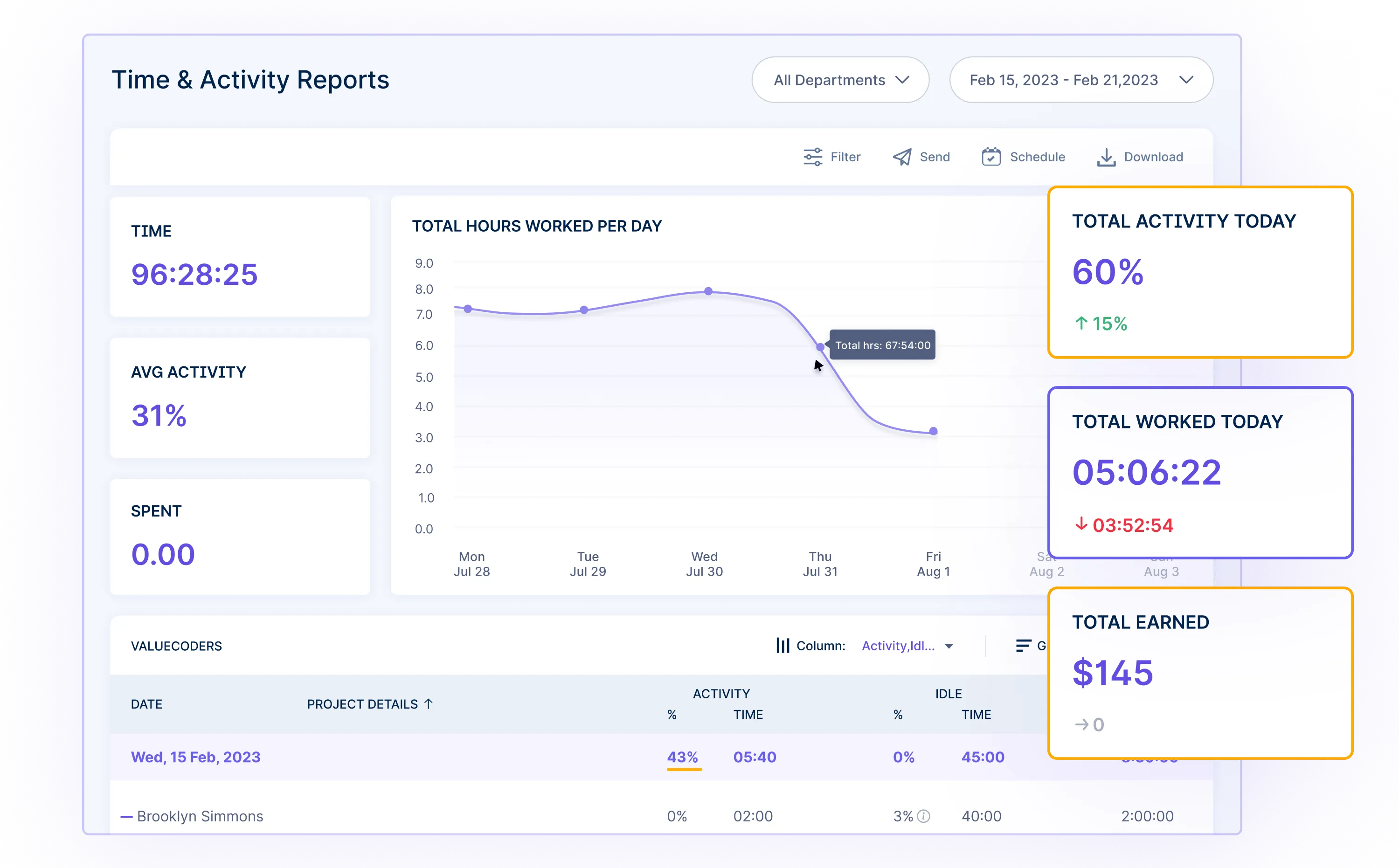
Recognizing the need for nuanced reporting in swing shifts, Workstatus introduces AI-powered reporting features to derive actionable insights from workforce data.
- Advanced Analytics
Workstatus AI-powered reports offer advanced analytics, giving managers a deeper understanding of productivity, attendance patterns, and overall workforce trends during swing shifts.
- Customizable Reports
The platform allows for the customization of reports based on specific swing shift requirements, ensuring that managers can focus on key metrics and tailor insights to the unique challenges posed by non-traditional working hours.
- Predictive Analytics
Leveraging AI capabilities, Workstatus reporting tools offer predictive analytics, allowing managers to anticipate trends and make proactive decisions to optimize operations and address swing shift challenges effectively.
Collectively, these solutions address the challenges associated with workload management and AI-powered reporting during swing shifts, contributing to a more streamlined and optimized approach to managing a workforce with varying schedules.
Tips On Introducing Swing Shifts In Your Business
Implementing swing shifts in your business requires careful planning and consideration to ensure a smooth transition for management and employees.
Here are essential tips to guide you through the process:
- Communicate Transparently:
Clearly communicate the reasons for introducing swing shifts, outlining the benefits for the business and employees.
- Provide Adequate Training:
Offer comprehensive training programs to equip employees with the skills and knowledge needed for their swing shift roles.
- Consider Employee Preferences:
Consider your workforce’s preferences when assigning swing shifts whenever possible.
- Implement Support Systems:
Establish support mechanisms, such as mentorship or employee assistance programs, to assist workers during the transition.
- Monitor and Adjust as Needed:
Regularly assess the impact of swing shifts on both productivity and employee well-being. Be prepared to make adjustments based on feedback and performance evaluations.
Conclusion
Adopting swing shifts brings unparalleled benefits to your business, from heightened flexibility to increased productivity. To make this transition seamless, prioritize transparent communication, provide thorough training, consider employee preferences, establish robust support systems, and commit to ongoing monitoring.
Explore the efficiency of Workstatus, your ally in workforce optimization.
With features like online timesheets and AI-powered reports, Workstatus ensures a smooth integration of swing shifts.












